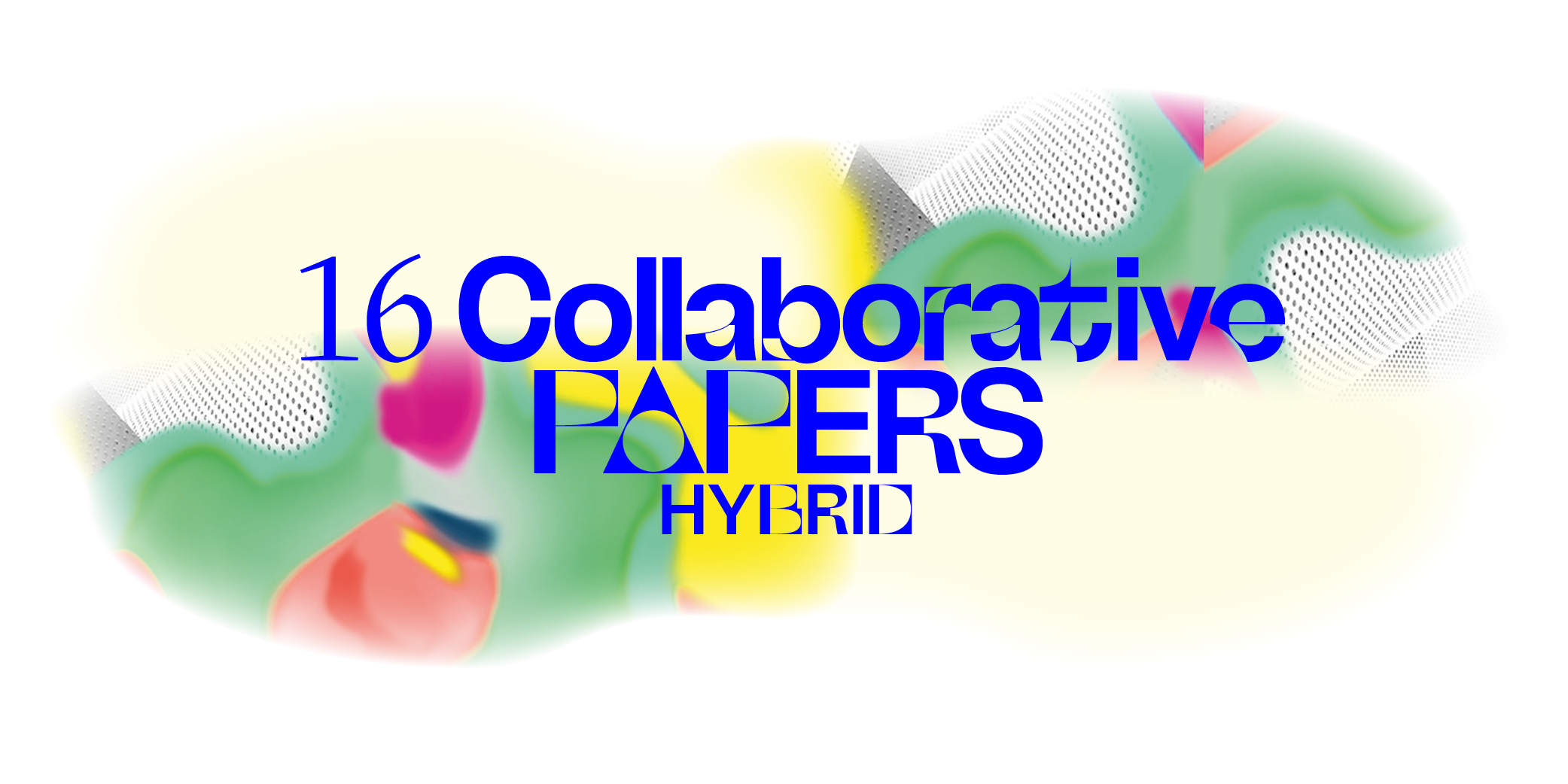‘The classroom remains the most radical
space of possibility in the academy […] Urging all of us to open our minds and
hearts so that we can know beyond the boundaries of what is acceptable, so that
we can think and rethink, so that we can create new visions…’
[3] bell hooks, 1994
De-Fashioning Education was a call to action as much as contemplation.
A collaborative, critical and creative re-thinking and re-making of fashion education. An exploration of different fashion learning cultures Education for essential de-growth calls for radically different educational models and approaches: a community of learners who aim to co-create shared and diverse futures, relationships with nature, and with one another.[1] De-Fashioning Education explored how to bring the learning and practices of fashion into balance with nature’s limits and needs and the equality and well-being of all human beings. An education for being, not only for having.[2] De-Fashioning Education was an open access conference, a collaborative contemplative space to consider contradictions and develop shared action. It invited to re-imagine how we can learn for interexistence and interbeing – fashion education for the pluriverse.[5]
15 -16 September 2023 Berlin
Berlin University of the Arts & online
The event was friendly supported by Einstein
Foundation, Berlin University of the Arts , The American
University of Paris and InKüLe
society’, Degrowth conference Leipzig, 3 September, https://www.youtube.com/watch?v=-iewh1DG2Ug.
[2] Fromm, Erich (1976) ‘Introduction: The Great Promise, Its Failure, and New Alternatives’ in: To Have or to Be?New York: Harper & Row, pp. 1–12.
[3] hooks, bell (1994) Teaching to Transgress: Education as the Practice of Freedom. New York: Routledge, p. 1
[5] Escobar, Arturo (2017) Designs for the Pluriverse: Radical Interdependence, Autonomy, and the making of Worlds, Durham & London: Duke University Press, p. 175.
Interested in further readings?
Visit the De-Fashioning Education – sources & resources online readling list
Visit the De-Fashioning Education – sources & resources online readling list
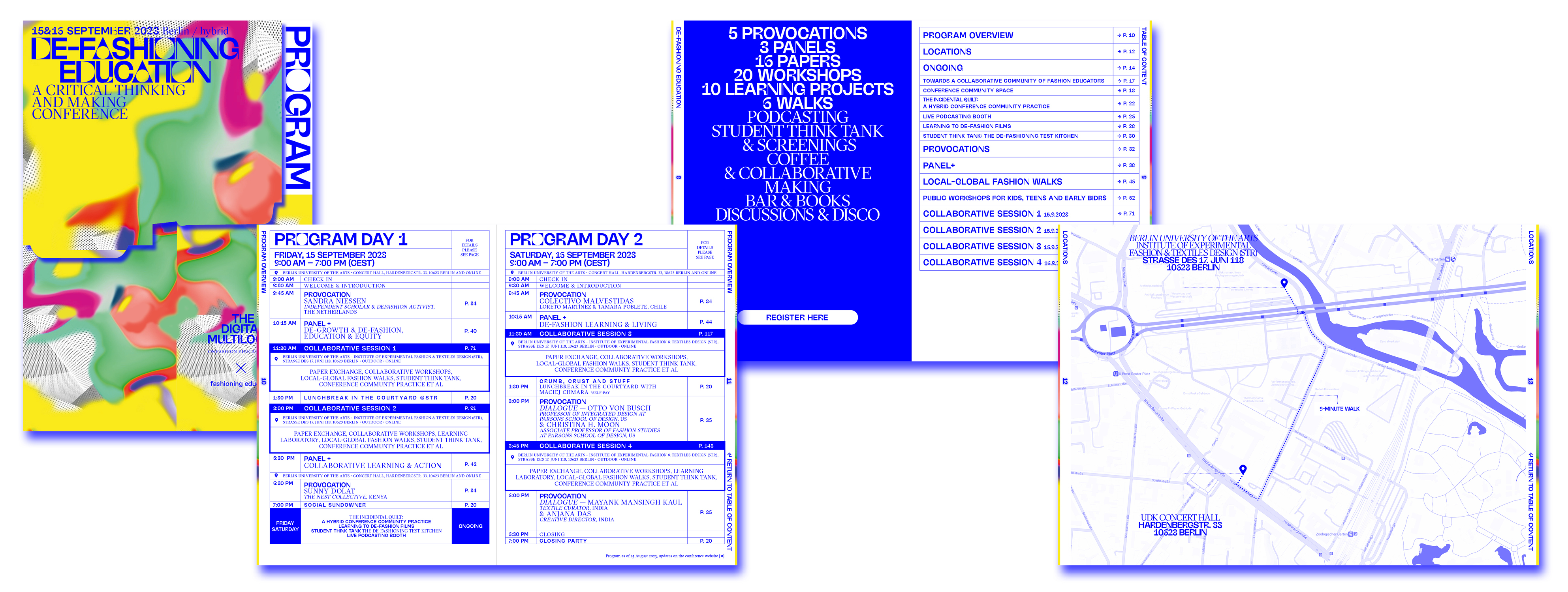

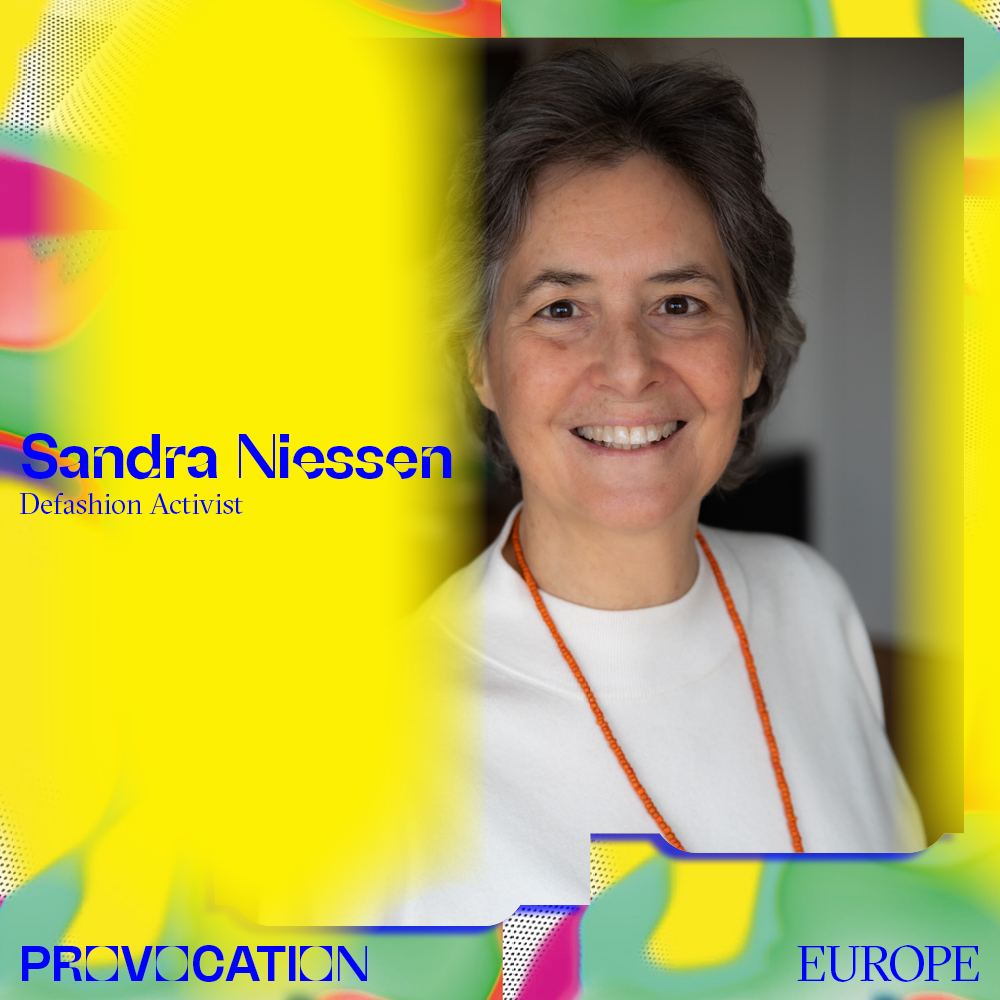
PROVOCATION Europe
Sandra Niessen
(Independent Scholar & Defashion Activist, The Netherlands)
Sandra Niessen is a cultural anthropologist who first visited North Sumatra, Indonesia, in 1979. That journey, having begun, did not end. Having her feet in two worlds has facilitated Sandra’s reciprocal reflections on the Batak clothing system and the Western clothing tradition and yielded critical insights into both. During these remarkable times of awareness and urgency, Sandra has joined forces with fashion activists to try to construct a non-dichotomized world of dress that is nurturing and fair. Her most recent publications on ‘Defashion’, which have informed this conference, are a manifesto and a roadmap to help us as we collectively work on getting it right.
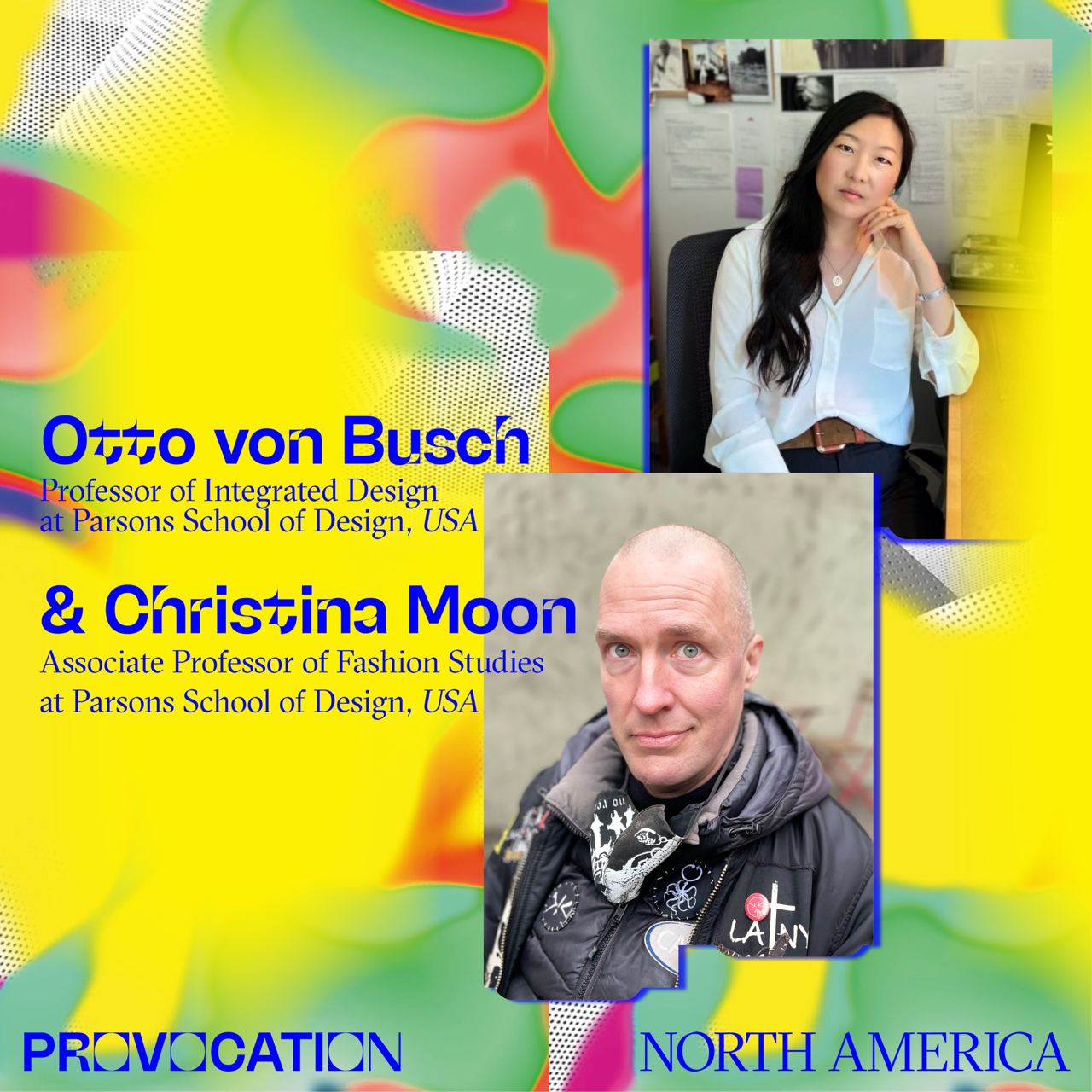
PROVOCATION North America
dialogue
Otto von Busch
(Professor of Integrated Design at Parsons School of Design, USA)& Christina H. Moon
(Associate Professor of Fashion Studies at Parsons School of Design, USA)
Otto von Busch is Professor of Integrated Design at Parsons School of Design. In his research he explores how the powers of fashion can be bent to achieve a positive personal and social condition with which the Everyperson is free to grow to their full potential.
Christina H. Moon is an Associate Professor of Fashion Studies in the School of Art and Design History and Theory at Parsons School of Design, The New School in New York. Her most recent project on the wardrobe explores the interplay of image, clothing, text and textile through diaspora, exile, and longing. She is author of Labor and Creativity in New York's Global Fashion Industry with essays in Vestoj: the journal of sartorial matters.

PROVOCATION Africa
Sunny Dolat
(The Nest Collective, Kenya)
Sunny Dolat is an accomplished cultural producer, creative director, and fashion curator. As the co-founder of the Nest Collective, he actively promotes art and culture in Kenya. He challenges social and political issues and is particularly concerned in his work with Africa’s place in global and cultural debates and dialogues.
Mayank Mansingh Kaul is a New Delhi-based independent curator with a focus on post colonial histories of Indian textiles. He has curated seminal exhibitions on Indian textiles, which include Fracture — Indian Textiles, New Conversations (Devi Art Foundation, Gurugram, 2015); New Traditions — Influences and Inspirations in Indian Textiles, 1947 — 2017 (Jawahar Kala Kendra, Jaipur, 2018); and Vayan — The Art of Indian Brocades (National Crafts Museum & Hastkala Academy and Devi Art Foundation, New Delhi, 2023). Editor of several publications on Indian textiles and design, he is a Contributing Editor for Architectural Digest India and Member of the Arts Advisory Council (South Asia) at The Asia Society.
Anjana Das heads her clothing label “White Champa” which is operating from a studio in New Delhi. Her expertise lies in bridge-building between India and Europe in the field of textiles and fashion. She has gained her experience in many years of working with artisans in the field of embroidery and tailoring. With a focus on intangible cultural heritage and creating awareness of methods of traditional sustainability, Anjana also aims to integrate the traditional forms of textile production with new ideas from the sustainability sector. She has been part of the project made/in which aims draw up a new vision for textile handcrafts.
PROVOCATION South America
Colectivo Malvestidas
Loreto Martínez & Tamara Poblete
(Chile)
Colectivo Malvestidas
Loreto Martínez & Tamara Poblete
(Chile)
Malvestidas (Poorly Dressed) is a Chilean feminist collective formed in 2016. The collective positions itself politically from Latin America and embraces decolonial resistance practices to explore clothing as a powerful tool of authority and control, and also of empowerment and subversion. Projects include performances, exhibitions, curatorial work, academic publications and conferences.
Loreto Martínez is a theatre designer, curator, and creative producer in various cultural projects. Bachelor of Arts with a minor in Theatre Design from the University of Chile. She has previous studies in Theory and History of Art and a diploma in Sociology of the Body. She also holds a master’s degree in Theatre, Film, Opera and Audiovisual Costume Design from the Istituto Europeo di Design, Barcelona (scholarship from the National Fund for the Development of Culture and the Arts). Her interests are the research, creation, and dissemination of critical cultural material that problematises gender, class, identity, and territory from transdisciplinary and collaborative methodologies applied to the body, the wearable, and performance practices
Tamara Poblete is a Researcher, curator and cultural manager in fashion and dress. For eight years she has been Arts Projects Manager at the British Council Chile. PhD candidate in the History of Design Department at the Royal College of Arts (scholarship from the London Arts and Humanities Partnership). She has a master’s degree in Creative and Cultural Entrepreneurship with a minor in Design from Goldsmiths University of London (two scholarships from the National Fund for the Development of Culture and the Arts and Goldsmiths Banco Santander Scholarship). Currently, she is developing research about the resignification of clothing as privileged tools of protest in contemporary feminist movements in Latin America from 2015 to 2019.
Tamara Poblete is a Researcher, curator and cultural manager in fashion and dress. For eight years she has been Arts Projects Manager at the British Council Chile. PhD candidate in the History of Design Department at the Royal College of Arts (scholarship from the London Arts and Humanities Partnership). She has a master’s degree in Creative and Cultural Entrepreneurship with a minor in Design from Goldsmiths University of London (two scholarships from the National Fund for the Development of Culture and the Arts and Goldsmiths Banco Santander Scholarship). Currently, she is developing research about the resignification of clothing as privileged tools of protest in contemporary feminist movements in Latin America from 2015 to 2019.

with
SAMIRA IRANPostdoctoral Researcher And Lecturer At Technische Universität Berlin And Project Lead At Hot Or Cool Institute (Germany/Iran)
RAHEMUR RAHMAN
Senior Lecturer At Central Saint Martins London, Artist, Designer, Filmmaker (UK)
ANDREA VETTER
Transformation Researcher & Doctor of Philosophy,HBK Braunschweig (GERMANY)
facilitated by
RENATE STAUSS
Dr, Assistant Professor, Fashion Studies, Department of Communications, Media and Culture, The American University of Paris (FRANCE/GERMANY)
SAMIRA IRANPostdoctoral Researcher And Lecturer At Technische Universität Berlin And Project Lead At Hot Or Cool Institute (Germany/Iran)
RAHEMUR RAHMAN
Senior Lecturer At Central Saint Martins London, Artist, Designer, Filmmaker (UK)
ANDREA VETTER
Transformation Researcher & Doctor of Philosophy,HBK Braunschweig (GERMANY)
facilitated by
RENATE STAUSS
Dr, Assistant Professor, Fashion Studies, Department of Communications, Media and Culture, The American University of Paris (FRANCE/GERMANY)
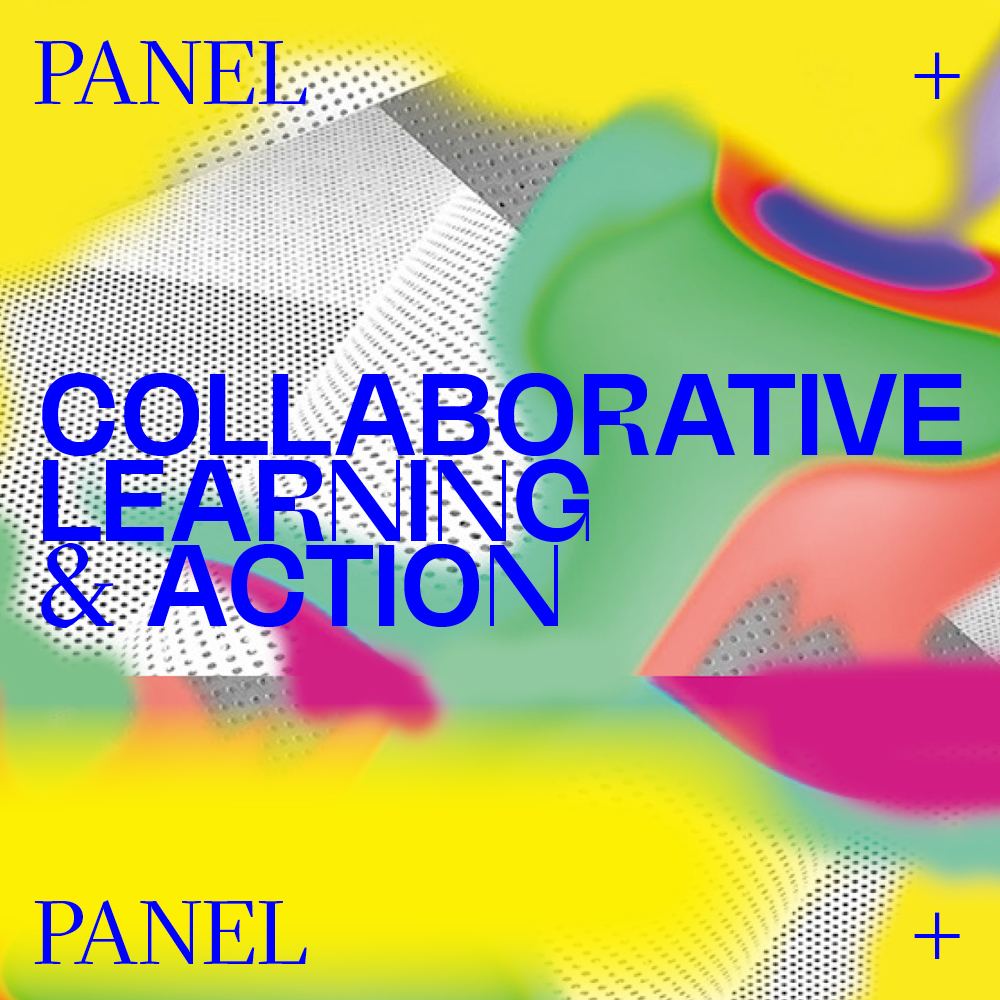 with
withELIZABETH HACKSPIEL
Netzwerk Mode Textil (Germany)
SOPHIE KURKDJIAN
Culture(S) de Mode (France)
LESIBA MABITSELA
African Fashion Research Institute AFRI
(South Africa)
MATTHEW NEEDHAM
Trash Club (UK)
TIMO RISSANEN
Union of Concerned Researchers in Fashion UCRF (Australia)
facilitated by
MI MEDRADO
Anthropologist, Co-Founder Brazilian Decolonial Studies in Fashion Network & Founder-Researcher of Fashion and Decolonization:Global South Crossing Working Group and Collective (Brazil)
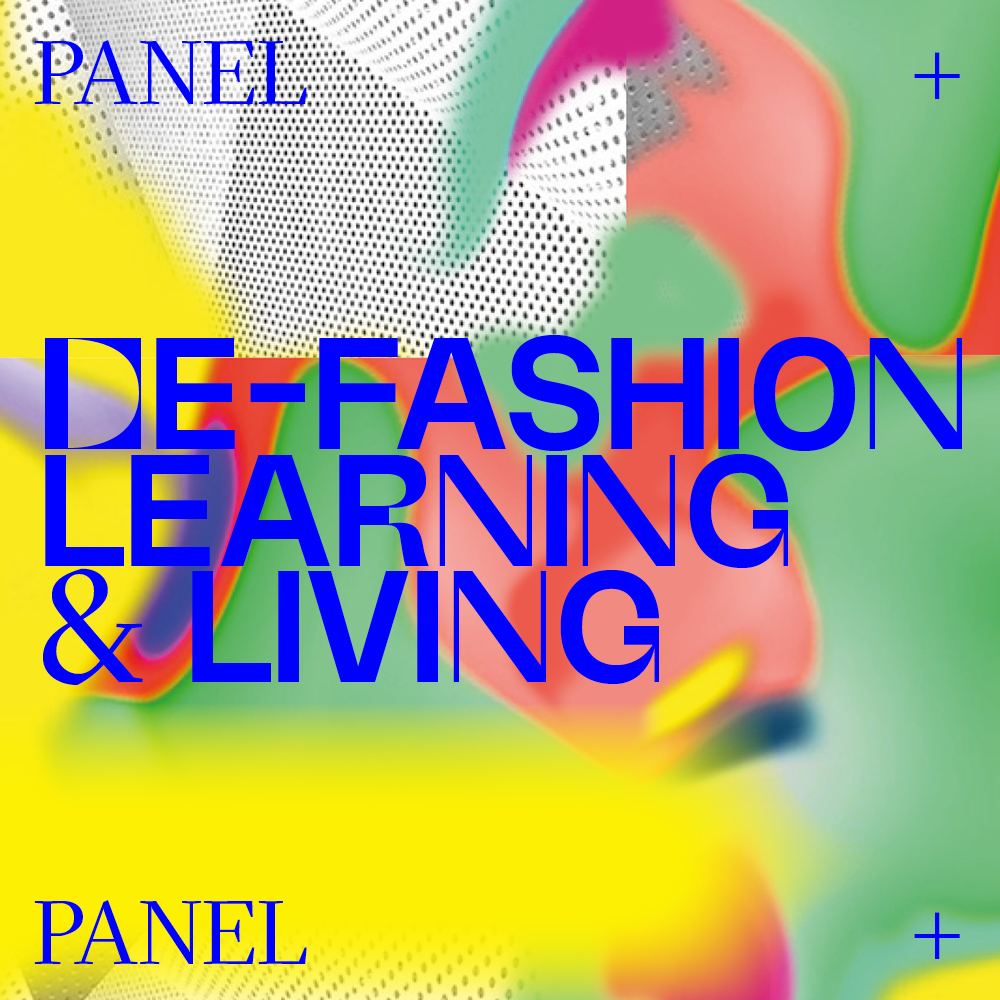
with
KATHERINA DEEKEN
Founder of Deeken HR (Germany)
PAULA KEILHOLZ Fashion Transformation Activist Threads&Tits, Fashion Design Graduate Berlin University of The Arts (Germany)
TIMISOLA SHASANYA
Fashion Design Student Central Saint Martins College London (UK)
OLIVER IBERT
Professor for Spatial Transformation and Social Research at the Brandenburg University of Technology BTU (Germany)
BOBBY KOLADE
Designer BUZIGAHILL (UGANDA)
DILYS WILLIAMS
Professor of Fashion Design for Sustaiability, University of the Arts London (UK)
facilitated by
ZOWIE BROACH
Head of Fashion MA Royal College of Art (UK)
KATHERINA DEEKEN
Founder of Deeken HR (Germany)
PAULA KEILHOLZ Fashion Transformation Activist Threads&Tits, Fashion Design Graduate Berlin University of The Arts (Germany)
TIMISOLA SHASANYA
Fashion Design Student Central Saint Martins College London (UK)
OLIVER IBERT
Professor for Spatial Transformation and Social Research at the Brandenburg University of Technology BTU (Germany)
BOBBY KOLADE
Designer BUZIGAHILL (UGANDA)
DILYS WILLIAMS
Professor of Fashion Design for Sustaiability, University of the Arts London (UK)
facilitated by
ZOWIE BROACH
Head of Fashion MA Royal College of Art (UK)

facilitated by
LOU CROFF BLAKE
& THEODORUS JOHANNESTHE QUEER NEEDLEWORK CIRCLE BERLIN
THE NETHERLANDS / US
& CLARE FARRELL
Extinction Rebellion
UK
& YR JOHANNSDOTTIR
YRURARI
GERMANY / ICELAND
LOU CROFF BLAKE
& THEODORUS JOHANNESTHE QUEER NEEDLEWORK CIRCLE BERLIN
THE NETHERLANDS / US
& CLARE FARRELL
Extinction Rebellion
UK
& YR JOHANNSDOTTIR
YRURARI
GERMANY / ICELAND
MAKE TOGETHER! Over the course of the conference, all were invited to join in crafting a wearable quilt segment, which was joined together in a ‘phygital’ amalgamation of the contributions. Participants were provided with fabric, thread, paint and stamps, fabric markers, and other materials with which to embellish their piece. Using words, symbols, and imagery, segment were designed to speak about individual and community values, thoughts and actions around De-Fashioning Education. Participation from many parallel activist stances is a display of intra-group solidarity! The quilt segments were finished with a long tie at each corner; it could then be fastened to other finished segments, which were gathered and grown in the space, intermixing with projected digital submissions, forming a continually expanding quilt.
Photos: Nikolaus Brade

DE-FASHIONING EDUCATION
A GLOBAL CHOIR OF IDEAS
THE FORMAT
3 questions in 5 minutes, recorded via Zencastr
(by phone or pc, no extra equipment needed)
THE QUESTIONS
What does fashion education
mean in different places, and what meaning does
de-growth hold there?
How do we teach fashion for being,
not (just) having?
How do you de-fashion education
(and who needs to de-fashion)
LISTEN
the Global Choir of Ideas will be launched soon. Enjoy all previous editions of
Fashion is a great teacher - The fashion education podcast
HERE.
THE DIGITAL MULTILOGUE collaborated with Fashion is a great teacher – the fashion education podcast* to create a lasting multilogue. Participants of the De-Fashioning Education Conference voiced and shared thoughts, ideas and solutions; joined a global community of fashion learners and built a global choir of ideas. The edited audio Multilogue will be launched soon.
Fashion is a great teacher is a collaborative laboratory on learning and teaching fashion. The research and development project, educational platform, and connective consultancy was founded in 2019 by Franziska Schreiber (Prof, Fashion Design, Berlin University of the Arts – UdK) and Dr Renate Stauss (Prof Dr, Fashion Studies, the American University of AUP & UdK). Fashion is a great teacher is driven by their love for making and wearing fashion, for learning and thinking through fashion, and their belief in its connective, educational and transformative potential.
Photos: Nikolaus Brade
Fashion is a great teacher is a collaborative laboratory on learning and teaching fashion. The research and development project, educational platform, and connective consultancy was founded in 2019 by Franziska Schreiber (Prof, Fashion Design, Berlin University of the Arts – UdK) and Dr Renate Stauss (Prof Dr, Fashion Studies, the American University of AUP & UdK). Fashion is a great teacher is driven by their love for making and wearing fashion, for learning and thinking through fashion, and their belief in its connective, educational and transformative potential.
Photos: Nikolaus Brade

INSTALLATIVE SCRENINGS
by
KATERINA IVANOVA
A video journal of making wardrobe essentials from scratch / making chatty
tutorials for each piece, with bits of fashion theory & history
SANDRA NIESSEN
‘Mja Nashir’
DANIELA TOLEDO ESCARATE
Virado: Unlearning Design Through Crafts
FIRDA AMELIA
‘GILI GILI’ - a documentary following
the stories of five individuals
on their self-expression journey in Jakarta.
BODIES AND FABRICS - VIDEO SHOWCASING
Bodies and Fabrics are one-day workshop explorations on relationships
between bodies, fabrics and moving images with the focus
on non-hierarchical work, sustainability and immediate matetrial use.
The videos were created collaboratively between students
of the study program Costume Design (MA),
department of Film Costume Design and
the Moving Image Class of the study programs Visual Communication (BA)
and Art and Media at the UdK Berlin
supervisioned by Prof Anna Anders, Sophie Klebba & Prof Lisa Meier
De-Fashioning Education invited film submissions dedicated to the rich plurality of fashion making and to de-hierarchize fashion learning for an audience of everyone, to inspire active making cultures, self-teaching and -empowerment. Films could be viewed continually throughout the conference in the Community Space and around the building.
Weaving past and present: Women’s stories between The Silk Road and East Berlin
Two short films tell stories of female labour and solidarity, remembrance and resistance, and intergenerational memories. In the realm of education, films can facilitate an
understanding of history and hone our empathy of people's experiences. They can link personal and collective as well as local and global (textile) histories while fostering an understanding of the world through the lens of fashion and textile narratives.
The film screening was followed by a conversation with the filmmakers Michelle & Noel Keserwany, Betina Kuntzsch, Lisa Meier and Ira Solomatina.
This session was co-curated by shorts/salon and Johanna Braun and kindly facilitated by Anna Henckel-Donnnersmarck.For further details see program.
Weaving past and present: Women’s stories between The Silk Road and East Berlin
Two short films tell stories of female labour and solidarity, remembrance and resistance, and intergenerational memories. In the realm of education, films can facilitate an
understanding of history and hone our empathy of people's experiences. They can link personal and collective as well as local and global (textile) histories while fostering an understanding of the world through the lens of fashion and textile narratives.
The film screening was followed by a conversation with the filmmakers Michelle & Noel Keserwany, Betina Kuntzsch, Lisa Meier and Ira Solomatina.
This session was co-curated by shorts/salon and Johanna Braun and kindly facilitated by Anna Henckel-Donnnersmarck.For further details see program.

For whom
Students and recent graduates
whose studies and work revolve
around fashion and textiles and who are
on the journey towards socio-ecological
change in the field of fashion
facilitated by
Nina Birri & Isabell Schnalle
With Special Guests
KIM HOU
Co-Founder & creative director About A Worker (France)
BOBBY KOLADE
Designer, Buzigahill (Uganda)
MATTHEW NEEDHAM
Co-Founder of Trash Club, Sustainability Lead Lecturer
forFashion at Central Saint Martins (United Kingdom)
Using the impulses of the De-Fashioning Education Conference as a framework, the Test Kitchen was a space for collective reflection, experimentation, action and to explore possibilities of de-growth in fashion and textile practices. Through a series of workshops participants explored de-growth from a wide range of perspectives and positions and interlinked these with topics such as local production, activism, the role of care, approaches to the human and non-human environment, and roles as designers within a global fashion system.
The Student Think and Make Tank is supported by Die Kommission für künstlerische und wissenschaftliche Vorhaben (KKWV) of the Berlin University of the Arts (UDK)
Photos: Nikolaus Brade
ORGANISERS
The Digital Multilogues on Fashion Education X Fashioning Education
Franziska Schreiber, Prof, “Fashion I Body I Digitality”, Berlin University of the Arts, The Digital Multilogues on Fashion EducationX Fashioning Education
Renate Stauss, Prof Dr, Fashion Studies, Department of Communications, Media and Culture, The American University of Paris & Associate Lecturer at Berlin University of the Arts, The Digital Multilogues on Fashion EducationX Fashioning Education
Valeska Schmidt-Thomsen, Prof, Fashion Design, Institute of Experimental Fashion & Textiles Design, Berlin University of the Arts, Fashioning Education
CONFERENCE BOARD
SCIENTIFIC COMMITTEE
Agata Rudnicka, PhD, Adiunct Faculty of Management University of Lodz, Poland. Angela McRobbie, Professor Emeritus, Goldsmiths University of London, UK. Dagmar Venohr, PhD, Lecturer of History and Theory of Fashion, University of Applied Sciences and Arts Northwestern Switzerland FHNW, Academy of Art and Design in Basel, Switzerland. Elizabeth Kutesko, PhD, Pathway Leader BA Fashion Communication: Fashion History and Theory, Central Saint Martins, London, UK. Erika DeGreef, PhD, co-founder of the African Fashion Research Institute (AFRI), Curator at Large in Fashion at Zeitz Museum of Contemporary Art (MOCAA) in Cape Town, South Africa. Friederike von Wedel, Director and Founder Beneficial Design Institute & Dean of Study Affairs “Sustainability in Fashion & Creative Industries”, AMD, Berlin, Germany. Laura Beltran-Rubio, PhD candidate at William & Mary (Virginia), USA.Laya Chirravuru, Design Researcher and Community Engagement Lead Roots Studio, India.Liudmila Aliabieva, PhD, Associate Professor: Faculty of Creative Industries / HSE Art and Design School, Editor-in-Chief of Russian Fashion Theory: the Journal of Dress, Body & Culture, Russia. Lucia Ruggerone, PhD, lecturer, School of Applied Social Studies, The Robert Gordon University, Aberdeen, UK. Marloes ten Bhömer, Senior Research Fellow, Kingston University, UK. Melchior Rasch, BA Fashion Design 2nd year, member of student council design, Berlin University of the Arts, Germany. Monika Rosinska, PhD, Assistant Professor, Head of Design Theory and Research, Dean’s Deputy for Interdisciplinary Projects, Faculty of Design, SWPS University of Social Sciences and Humanities, Warsaw, Poland. Nina Stevenson, Education for Sustainability Leader, Centre for Sustainable Fashion, London College of Fashion, UK. Oliver Ibert ,Prof, Dr, Leibniz Institute for Research on Society and Space (IRS),Germany.Roberto Filippello, Postdoctoral Fellow at the University of British Columbia and an incoming Assistant Professor of Media & Culture at the University of Amsterdam, Canada/Italy. Samira Iran, Postdoctoral Researcher and Lecturer, Technische Universität Berlin and Project Lead at Hot or Cool Institute, Iran. Teresa Fagbohoun, Artistic Associate Fashion and Textile Design, Berlin University of the Arts, Germany. Timo Rissanen, Associate Professor, academic lead of the Centre of Excellence in Sustainable Fashion and Textiles, University of Technology Sydney (UTS), Australia.Yvonne Ntiamoah, Head of Fashion and Design Department Radford University, Accra, Ghana.Valeska Schmidt-Thomsen, Professor of Fashion Design, Berlin University of the Arts, Germany.Wowo (Waldemar) Kraus, Professor of Fashion Design, Berlin University of the Arts, Germany.





